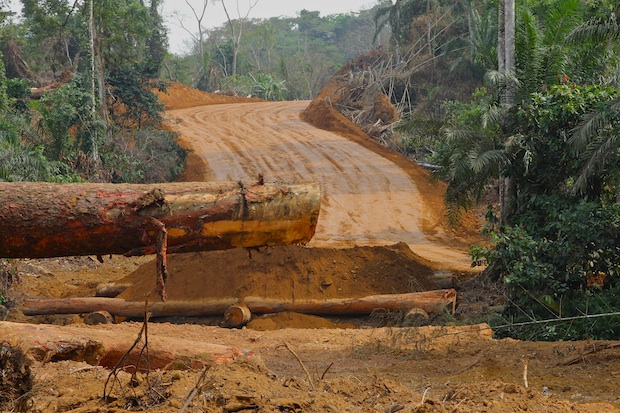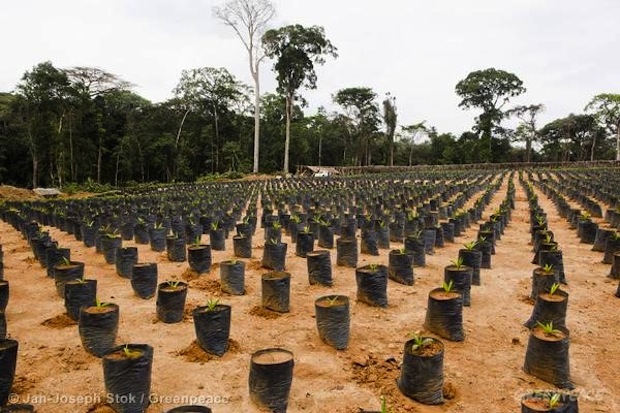Industrial agriculture is the main cause of deforestation around the world. That’s no surprise. And according to a recent study commissioned by the British organization Forest Trends, at least half of the tropical hardwoods sold today are the the by-product of deforestation for agriculture. The same study also indicates that more than half of the forests converted to agricultural use were done so illegally. The wood coming from those operations should also be considered illegal, but for now, this is not usually the case.
Developers use the proceeds from timber sales to finance agricultural operations. In some cases, developers may be more interested in timber than agriculture and an agricultural project may be a logging operation in disguise. Consider the case of the controversial Herakles Farms project in Cameroon. The land Herakles acquired was not available for logging, but now that the company is developing an oil palm plantation (on paper, at least), it is clear-cutting forest and looking to profit from timber sales. At this point, it is unclear that the company will proceed with planting and it is possible that it may simply sell timber before selling the project.
Herakles Farms is not alone in this questionable practice.
Filip Verbelen of Greenpeace, Belgium, has written an interesting article on the relationship between palm oil and illegal logging, which we’re posting.
La déforestation pour l’huile de palme alimente aussi le commerce de bois illégal
De récentes études sur les causes de la déforestation pointent l’expansion rapide de l’agriculture commerciale. Un petit groupe de produits d’exportation accapare le haut du tableau : en Amérique latine, il s’agit principalement de la production à grande échelle de viande et de soja ; en Asie du Sud-Est, c’est surtout la production de pâte à papier, de papier et d’huile de palme qui favorise la déforestation.
À l’origine de cette destruction des forêts, on retrouve la demande en augmentation rapide pour ces produits sur les marchés internationaux. Le Brésil exporte la majeure partie de sa production de soja. La Malaisie et l’Indonésie représentent ensemble plus de 80% de la production mondiale d’huile de palme et en exportent plus de 80%. Une étude récente révèle que l’Europe, à l’échelle du monde, est de loin le plus grand consommateur de denrées dont la production stimule la déforestation. L’« empreinte » de l’Europe en termes de déforestation a été, au cours de la dernière décennie, deux fois plus large que celles de la Chine et du Japon réunis !
Bois illégal
Depuis quelques années, on constate également que cette déforestation accélérée au profit de l’agriculture commerciale influence en profondeur le marché international des bois durs tropicaux. L’exploitation forestière précède en effet souvent une réaffectation des terres, dans le cadre de laquelle les revenus issus de la vente du bois servent de capital destiné au développement de projets agricoles. Une étude britannique commandée par l’organisation Forest Trends estime qu’au moins la moitié de tous les bois tropicaux négociés dans le monde provient de forêts détruites pour l’aménagement de cultures. Les premiers résultats de cette étude indiquent aussi que plus de 50% de ces reconversions de forêts en cultures pour l’industrie agricole se font dans l’illégalité. Le bois qui en est tiré doit dès lors, lui aussi, être considéré comme illégal.
Au Brésil, par exemple, l’analyse de récentes photos satellites montre qu’une grande partie de la déforestation à des fins d’élevage et de culture du soja est en infraction avec les autorisations octroyées aux entreprises concernées. En Indonésie, l’essentiel de la déforestation actuelle doit être imputé à l’essor rapide de l’industrie de l’huile de palme. De nombreuses études dénoncent les méthodes utilisées en Indonésie par les entreprises productrices d’huile de palme pour contourner la législation : les forêts sont rasées pour leur substituer des plantations non autorisées ; l’exploitation de certaines forêts implantées sur des tourbières, bien qu’interdite, est malgré tout souvent observée ; des forêts sont volontairement incendiées par des producteurs d’huile de palme qui convoitent ces terres, etc. Les multiples conflits d’intérêts entre la sphère politique et l’industrie agricole encouragent en outre la corruption et étouffent, parfois totalement, la répression des pratiques illégales.
L’Afrique n’est pas épargnée
Si l’Indonésie restreint de plus en plus le développement de l’industrie de l’huile de palme – tandis que la demande mondiale continue de croître –, des projets de nouvelles cultures d’huile de palme se multiplient rapidement en Afrique centrale et de l’Ouest. Et à l’instar de l’Asie, une part considérable de la déforestation en Afrique afin de permettre ces cultures se déroule dans l’illégalité. Quelques exemples :
- Au Cameroun, l’entreprise américaine Herakles Farms poursuit l’installation d’une plantation controversée de 70 000 hectares dédiée à l’huile de palme dans une zone à haute valeur écologique. Bien qu’elle ne possède pas les autorisations exigées, cette société a quand même commencé à abattre de grands pans de la forêt tropicale. Des documents internes à l’entreprise lèvent par ailleurs tout doute sur ses espoirs de gagner des millions de dollars grâce à la vente de ces bois durs, même si elle a toujours prétendue ne pas s’intéresser aux bois durs tropicaux et vouloir laisser ce bois aux autorités camerounaises.
- Au Libéria, le gouvernement a octroyé ces dernières années des centaines de milliers d’hectares de forêt en concessions à, notamment, des entreprises d’exploitation forestière et à des sociétés désireuses d’implanter des cultures d’huile de palme. Un audit indépendant sur l’attribution de ces contrats a conclu que l’octroi d’un grand nombre de ces concessions n’avait pas respecté les prescriptions légales. Se pose dès lors la question de la légalité du bois provenant de ces concessions.
- Au Congo-Brazzaville, un groupe malaisien a acquis les droits relatifs aux plantations Atama. Atama possède dans ce pays une concession de 470 000 hectares au beau milieu de la forêt tropicale, dont 180 000 hectares vont servir à la culture de l’huile de palme. Il s’agit vraisemblablement du plus grand projet lié à l’huile de palme dans le bassin du Congo. La coupe à blanc à grande échelle de la forêt tropicale a débuté en 2012 sans attendre les études d’incidences sur l’environnement exigées par la loi. Les inspecteurs gouvernementaux ont déjà relevé de nombreuses infractions à la législation forestière. Si ce projet est mené à son terme, il multipliera par deux le taux de déforestation au Congo-Brazzaville. Il produira en outre, pendant plusieurs années, plus de bois que ne le font les concessions forestières déjà existantes dans le pays.
Des initiatives politiques actuelles insuffisantes
Les plans d’action actuels contre l’exploitation forestière illégale accordent encore trop peu d’importance à la lutte contre la déforestation illégale pour l’industrie agricole. Au sein de l’Union européenne, une nouvelle législation est entrée en vigueur en mars de cette année afin de rendre punissable l’importation de bois illégal. Son efficacité reste toutefois à prouver. Malgré l’existence de cette nouvelle réglementation, Greenpeace a déjà constaté à plusieurs reprises que du bois congolais abattu illégalement pouvait toujours être importé sans risque de sanctions sur le territoire européen. Les États membres de l’UE ne sont manifestement pas encore capables d’appliquer ces nouvelles règles. Le volume croissant de bois illégal issu de la déforestation illégale à des fins agricoles commerciales ne bénéficie par ailleurs de l’attention des décideurs politiques que depuis quelques années. Il ne s’agissait pas encore d’un dossier majeur à l’époque de l’élaboration du règlement européen sur le bois.
Les accords de partenariat volontaires que l’UE conclut depuis quelques années avec une série de pays grands producteurs de bois (tels que le Cameroun, le Congo-Brazzaville, le Libéria et l’Indonésie) en vue d’améliorer la gestion forestière et d’enrayer les coupes illégales tiennent eux aussi insuffisamment compte de la problématique de la conversion des forêts pour l’agriculture industrielle.L’Indonésie, par exemple, a signé ce mois-ci le dernier accord de partenariat volontaire en date avec l’Union européenne. Greenpeace a salué cet accord car l’Indonésie démontre par cette démarche qu’elle est disposée à combattre la corruption et les pratiques illégales. Mais Greenpeace a dans le même temps averti que l’Indonésie, si elle souhaite renforcer la crédibilité de sa politique forestière, doit décréter une interdiction de la réaffectation de zones de forêt tropicale pour y implanter des cultures commerciales.
Légal ou pas ?
Entre-temps, il semble aussi de plus en plus évident qu’il ne suffit pas de lutter contre les formes illégales de déforestation. Une approche trop polarisée sur la « légalité » peut même déboucher sur des résultats contraires : beaucoup d’entreprises parviennent ainsi à faire légaliser leurs pratiques illégales en demandant et en obtenant après coup les autorisations exigées. Dans certains pays tels que le Cameroun et le Brésil, on envisage même d’assouplir la réglementation sur le bois au lieu de la durcir. Des projets de déforestation encore interdits aujourd’hui pourraient ainsi à l’avenir être considérés comme parfaitement légaux.
Indépendamment des discussions sur la légalité, de nouvelles initiatives politiques sont dès lors activement recherchées pour s’assurer que des produits tels que la viande, le soja, le papier et l’huile de palme échangés sur les marchés internationaux ne proviennent plus de la déforestation au profit de l’agriculture industrielle. L’Union européenne est consciente de l’enjeu et étudie un plan d’action afin de traiter ce problème. Un tel plan devra aborder la consommation de ces produits au sein de l’UE sans oublier la collaboration avec les pays producteurs pour y consolider la politique forestière au niveau local. La nécessité d’un tel plan d’action – un plan pour « une réduction ciblée de la déforestation par l’agriculture commerciale » – a déjà été reconnue dans le septième programme d’action européen pour l’environnement et doit se concrétiser au cours des prochaines années.
Greenpeace maintient la pression sur les autorités et les entreprises afin d’adopter des mesures débouchant sur l’acceptation par les secteurs de l’agriculture industrielle d’une politique garantissant que leurs activités ne soient plus une source de déforestation.
Article originally published by Greenpeace Belgium, October 20, 2013
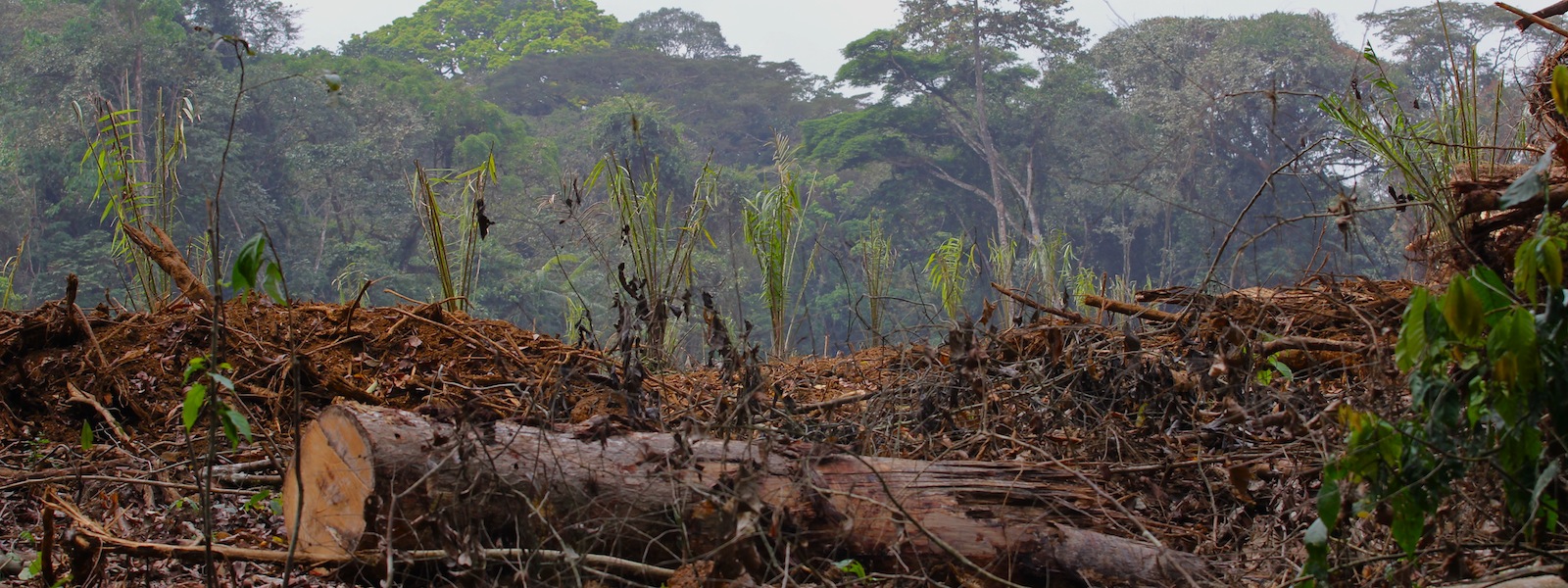
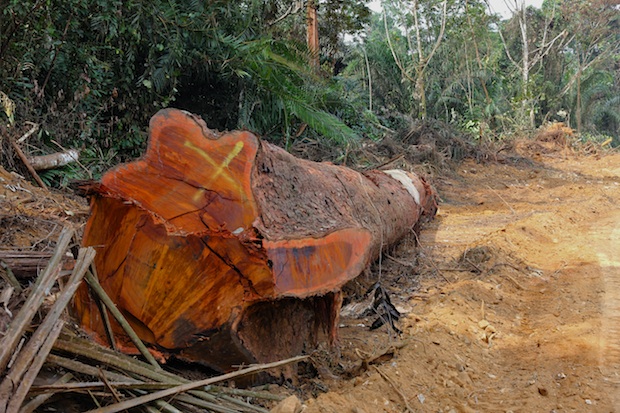
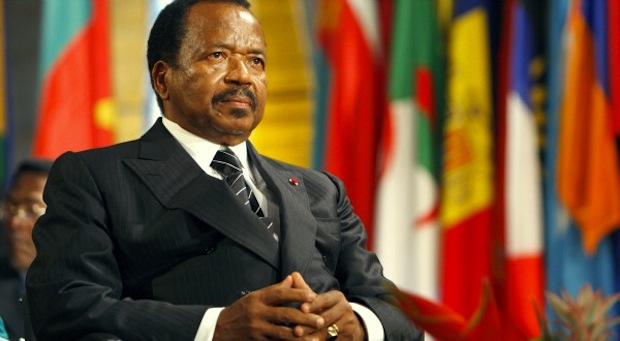
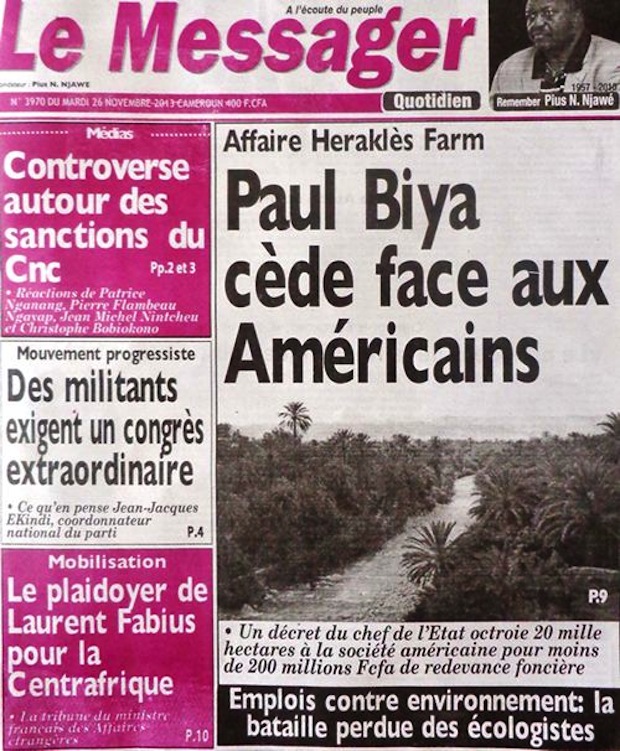
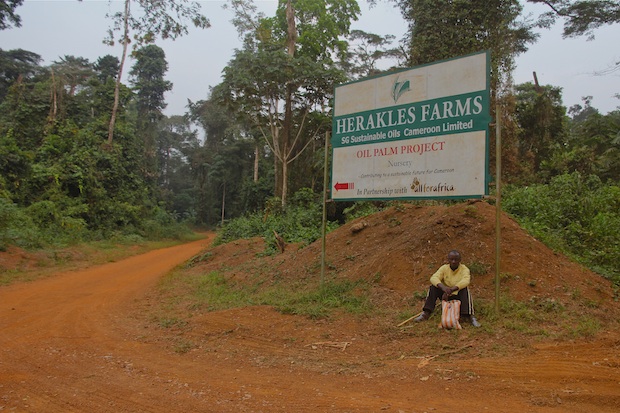
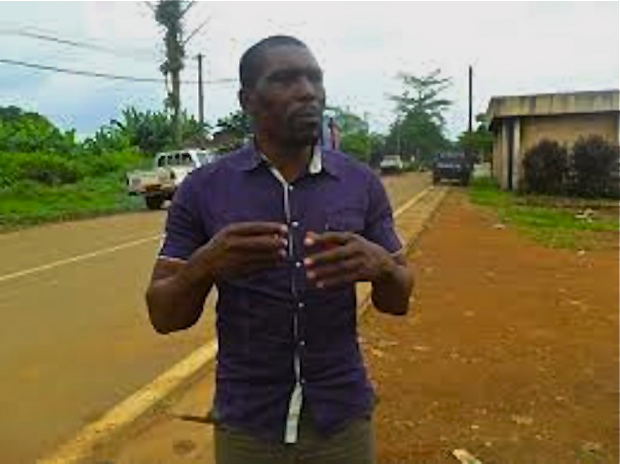
!["Non-complying member organisations can simply opt to leave the RSPO in the midst of a complaint, and consequently they will not be governed by any of our rules. The RSPO closely monitors the activities of its members [but] it has no legal way to enforce its members to comply." This is the case of Herakles Farms, Cameroon AKA SGSOC. The company withdrew from the RSPO in 2012.](https://www.palmwatchafrica.org/wp-content/uploads/2013/06/NtaleTshirt-resz.jpg)
